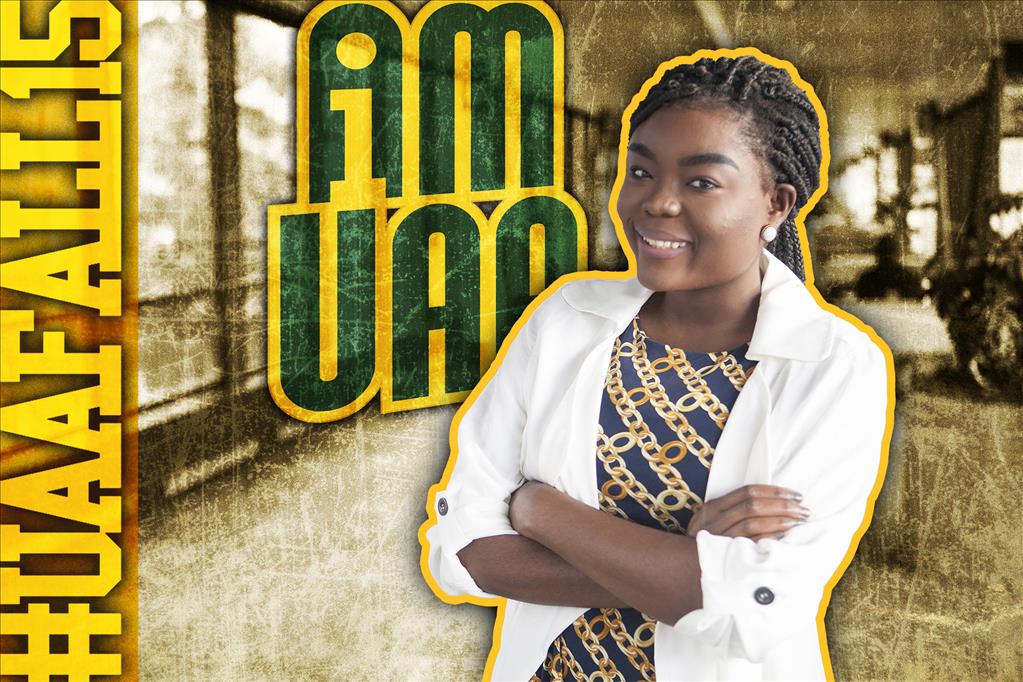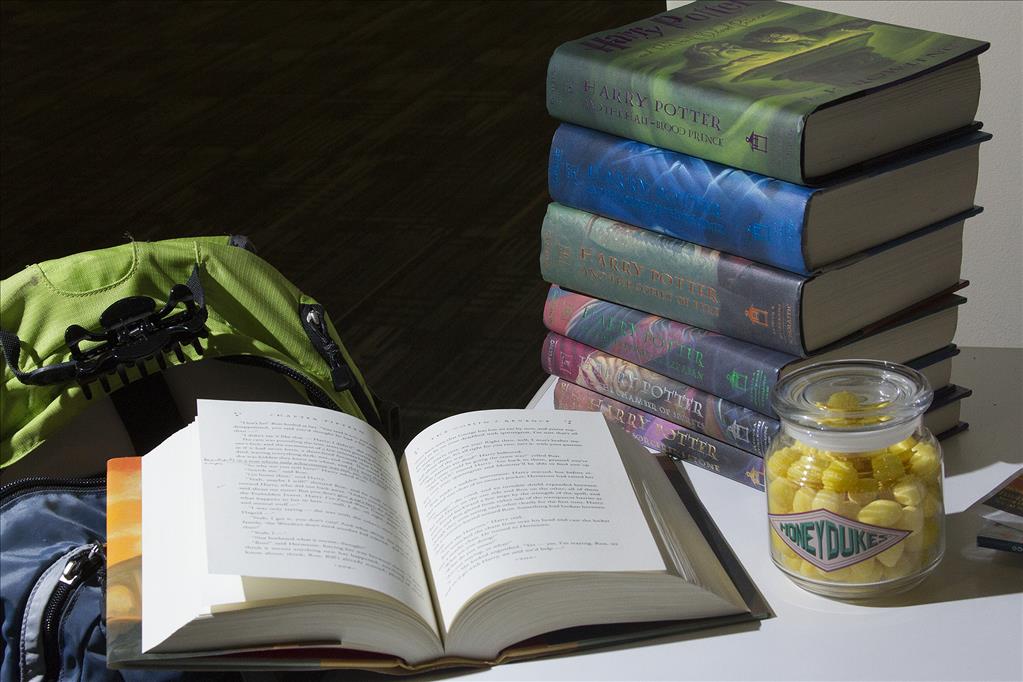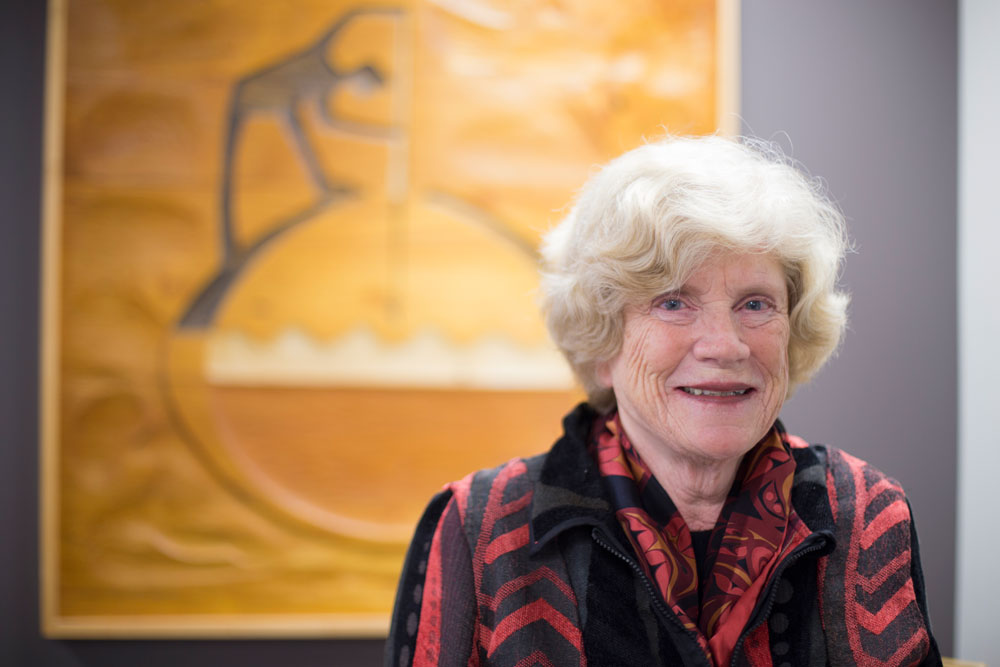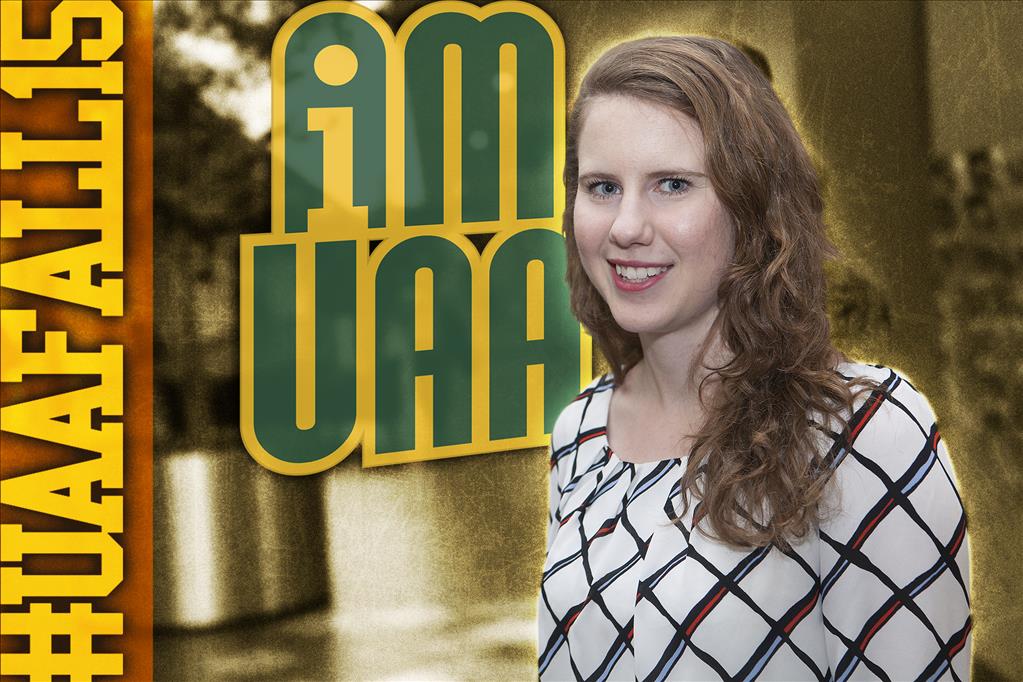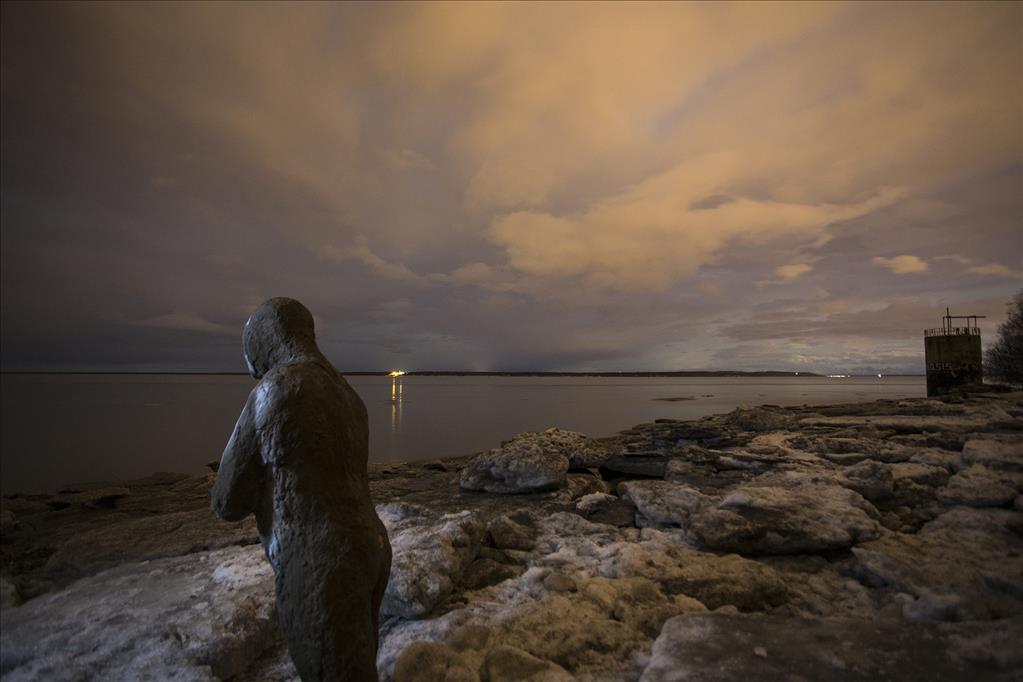Diversity award winner: 'Culture has really shaped me'
by Tracy Kalytiak |
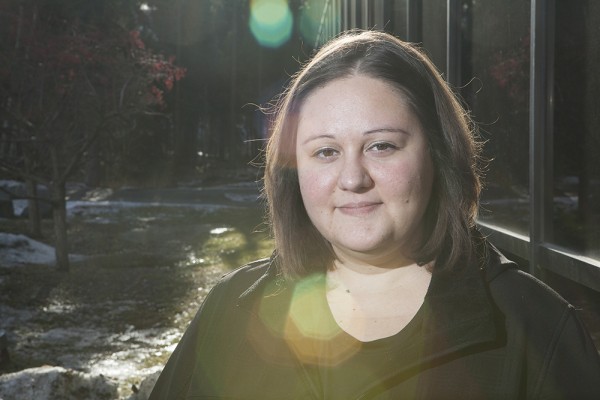
UAA's Diversity Action Council named Maria Crouch, a clinical-community psychology doctoral student, as one of its 2015 Spring Student Diversity Award winners. (Photo by Philip Hall/University of Alaska Anchorage)
As a girl of only 10 years old, growing up with a multicultural heritage of Athabascan and Mexican, I knew I was different. I liked girls but I also liked boys. This stirred many emotions inside of me, confusion being their main adhesive. I sought answers and comfort in my parents. Gathering all the courage I could, and with much trepidation, I posed several questions to my mother:
Will you still love me if I am different? There was a resounding "Yes." Will you still love me if I marry someone who's black? There was pause, and then, "Yes." Will you still love me if I'm gay? Silence. More silence. Out of the stillness resonated a quiet but firm, "No."
- Excerpt from Maria Crouch's Nov. 12, 2014 ADN editorial
Maria Crouch, a first-year doctoral student in the joint UAA-UAF Clinical-Community Psychology Ph.D. program, wrote that editorial as a class assignment.
"The purpose ...was to present psychological principles in accessible ways and dispel common misconceptions about the Lesbian, Gay, Bisexual, Transgender and Queer (LGBTQ) community," said Crouch, who focuses her research efforts on gender identity, cultural diversity and Alaska Native mental health.
Crouch's editorial is a key reason why UAA's Diversity Action Council recently named her one of its 2015 Spring Student Diversity Award winners.
"This was not only an incredibly welcoming piece-it was also an incredibly brave one," Dr. Claudia Lampman, director of the UAA Department of Psychology, wrote in her recommendation of Crouch for the award. "Although there have been hundreds of moments in my 23 years as a faculty member at UAA where I have been moved, inspired and incredibly proud of one of my students, reading this was one of the few that brought me to tears."
A welcoming spirit
Lampman met Crouch when Crouch was taking her advanced research methods course as an undergraduate.
"She is a rising star, that's how I would describe her," Lampman said. "She's a person who's a welcoming spirit, who values everyone and will not be afraid to make bold statements, not be afraid to put herself out there."
Lampman said UAA Professor E.J. David created the assignment in a community psychology class that culminated in Crouch writing her editorial.
"I love that he has his students doing this," she said. "It pushes them to go outside their comfort zone. I think that was a push for Maria but she really took it and leaped. To bring up something politically charged is hard, but to put yourself in it, too-that's brave. It's a testament to UAA and Anchorage that she felt comfortable doing that."
'Culture has been something that has made me proud'
Crouch grew up between Anchorage and Wasilla but her family is originally from Anvik-she emerged from a family immersed in Deg Hit'an Athabascan as well as Mexican and Scandinavian cultures.
"I would say my connection was with my grandparents and with my elders," she said. "I learned lots of wonderful things-history, cultural practices, traditions, spirituality-just a lot of really powerful things."
Crouch believes culture and ethnicity are "protective factors."
"It's been something that's been really grounding," she said. "It's a way of...when we go through this process of figuring out our identity, culture has been something that has made me proud. Culture has really shaped me, especially having an adverse upbringing and, in addition to that, being multicultural, being bisexual. These are all things that can really cause a lot of turmoil-not only socially but also internally."
Crouch moved frequently as a child. She spent long periods living with her grandmother in Mountain View and sometimes spent time out of state: with grandparents in Tacoma, Wash., for a summer, with an aunt in the ethnically rich Hamtramck area on the edge of a seedier part of Detroit while attending Catholic school.
"I think because I had a lot of adversity, I'm pretty adaptable," she said. "I just learned really quick where to walk, how to size people up. We lived right on the tracks and walking to school was 15 blocks. There'd be individuals cackling at you on the way, asking you to come into their house. But there was a really rich culture I was exposed to that was different from my own-a big population of Polish heritage, Armenian, Arabic. Being exposed to that was really positive and really cool."
Later, as a high school junior, Crouch attended a fundamentalist Christian boarding school in Mississippi.
"Going to boarding school was a nice change of pace for me," she said. "I actually liked that I knew what I was going to get, I liked that it was stable. In hindsight, the boarding school was not very open to diversity. You had to wear skirts, you weren't allowed to talk in your bedroom, you'd have to tell them how many squares of toilet paper you needed and you were only allotted a certain number based on your need."
Making healing happen
Five years ago, Crouch was working in business and sales but had long wanted to serve and facilitate healing for people living in Alaska Native communities.
"It's kind of corny, but I had taken a trip to Europe and I was like, 'What am I waiting for?'" she said. "I came back and enrolled in school with the intention that this is my goal, being a clinical-community psychologist."
A clinical psychologist makes change happen through one-on-one interactions-a "first order of change," Crouch said. A community psychologist, however, makes possible group-level-"second order"-changes that deliver a broad, communitywide impact.
"This is what I want to do, focus on things like empowerment, social justice and an appreciation for fostering diversity," she said. "Those have always been really important and those are integral to culture."
Crouch says it's vital to view people as whole people.
"A lot of times we work within a medical model, we only see people as their bodies," she said. "If someone gets sick, then they take a pill and we validate that. But if somebody gets emotionally sick or spiritually sick or mentally sick, as a society more often than not we choose not to see that or we choose to 'other' it. I feel passionate about it, it's an important part of who we are as human beings, so that's where I wanted to help."
Crouch and another student in the Ph.D. program, Jordan Skan, recently received prestigious National Institutes of Health minority research fellowship awards and will work on their own developed projects as part of an NIH-funded research project, "Healing and Empowering Alaskan Lives Toward Healthy Hearts," with Judith Prochaska of Stanford University School of Medicine, Caroline Renner, director of cardiology research and development at Alaska Native Tribal Health Consortium, and Neal Benowitz, University of California, San Francisco, as principal investigators.
Crouch, who has participated in the Alaska Native Community Advancement in Psychology program, proposed a project to develop and evaluate a culturally relevant measure of well-being. Conclusions from her project will be valuable for the parent project, which is targeting multiple cardiovascular disease risks for change. Crouch's proposal received four years' funding.
Skan, a Tlingit from Ketchikan who is a fifth-year UAA doctoral student, proposed a project focused on informed consent issues with sensitivity to culture, technology, geography and clinical versus research considerations-valuable to the parent project, given the intricacies involved with its remote clinical trial in rural Alaska. His proposal received two years' funding.
Crouch says her project looks holistically at what the term "quality of life" means for Alaska Native peoples.
"It's about wellness and it's about empowerment," she said. "The information we have [melds together] American Indian and Alaska Native populations [as a category]. But we're very different-we're geographically different, we're culturally different. An important part of empowerment is giving voice to people who don't have a voice or who don't have a very strong voice. I think that is driving this [research]-what exactly is it that is quality of life, in your own words, as opposed to someone saying, 'Well, this is what it is over here, this is what it is here; we'll put them together and that is quality of life for you.'"
Crouch will begin working on her community-based participatory action research study in late June, talking to focus groups in rural Alaska and having their responses in word-association activities help define what quality of life means for them.
"When it's all done, then I'll be going into dissertation," she said.
'It was a seed, at least, of change'
As an adolescent, Crouch said she noticed both girls and boys in a romantic way and realized she was bisexual.
"It's something I have kept really private outside of same-sex partners," she said. "Right now I'm married to my opposite-sex partner. I could keep going on, fit into the heterosexual norm, but no-this is who I am, this is my identity. I didn't want to lose part of that. Being bisexual, every time you tell somebody new, that's coming out. Whether it's a friend, whether it's an environment, in a job, every time you do that it's a process and it's scary."
Nevertheless, Crouch says coming out felt essential.
"For me it was really important that part of giving psychology away is also being a role model and saying, 'I'm a human being, I've experienced these things,' as opposed to just being an academic that says, 'I have this knowledge and this is how it works,'" she said. "It's important for me to say I'm a human being who's had all these experiences and this is how it's affected me."
Doing this, she said, came with a cost.
"I've lost people I loved in my life that were a little distant, that said I was wrong for being bisexual," she said. "At the same time I've had people that have said that in no way changes the way I feel about you, you are who you are. There are a lot of people out there who say, 'I don't know anybody that's LGBTQ,' but in reality you do, you just might not know it."
The editorial became another form of coming out.
"Instead of people thinking about it and 'othering' it, they started thinking about it, 'Hey, this is someone I love, this is someone who doesn't fit a stereotype,'" she said. "It was a seed, at least, of change. Some people were like, 'I think you're evil and don't want to speak to you again.' Some people were like, 'I love you and this makes me love you more.' And there were strangers saying, 'Thank you, this was very helpful for me.' It was the spectrum."
Why is coming out, again and again, so meaningful?
"There are disparities, issues-suicide rates are higher for individuals who aren't heterosexual," she said. "It's important for people in a position higher up in education, being multicultural, to say, 'I'm here.' That doesn't mean everyone is going to get there, but it means something. It would have been beneficial for me to have someone like that, to know you're not alone."
Did Crouch's mother have a change of heart after telling her daughter that devastating "no"?
"My mother is my mother," Crouch said, "but we're not of the same mind on it. She doesn't see it as this is how I was born-she sees it as it's a choice and it's the wrong choice. I still have a relationship with my mother; she came over and stayed the night with me on Saturday. But she is who she is. I can't change that. I think for her, she kind of compartmentalizes her life, so that has been put in a compartment she doesn't want to look at or accept. I can just be an example and be who I am."
Written by Tracy Kalytiak, UAA Office of University Advancement
 "Diversity award winner: 'Culture has really shaped me'" is licensed under a Creative Commons Attribution-NonCommercial 4.0 International License.
"Diversity award winner: 'Culture has really shaped me'" is licensed under a Creative Commons Attribution-NonCommercial 4.0 International License.










